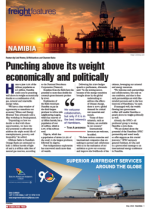There is economic spinoff from Namibia’s newly confirmed oil and gas deposits before the first production well has been sunk.According to the World Bank, investments in oil exploration contributed to a stronger-than-expected economic growth of 4.2% in 2023.“The economy has recovered to its pre-pandemic level, but many key sectors, including job-rich construction and financial services, continue to lag,” it states in an April review of the Namibian economy.In its March review of economic prospects, the Bank of Namibia predicts that economic growth will slow to 3.7% in 2024, and increase to 4.1% in 2025.The drop is due to subdued demand for minerals and a reduction in farming output due to drought.Oil and gas exploration activities have also decreased as the industry moves into the production phase.On the positive side, the bank sees growth in manufacturing and construction. Growth in manufacturing is being supported by increased demand in the beverages, leather, and related products subsectors.The construction sector is expected to have grown by 11.6% by the end of 2024, and a further 5.1% in 2025, due to investment by the mining sector and government infrastructure projects.Despite an expected slowdown in the rate of expansion over the next two years, the transport and storage sector “remains robust”.Sustained exports, coupled with growth in imports of industrial and consumer goods, are expected to support growth in the logistics-related sector of 6.4% in 2024 and 5.9% in 2025.Risks to domestic economic growth identified by the bank are predominantly related to drought, and high costs of key import items that “are likely to persist for a long time”.The Namibian dollar, which is pegged one-to-one to the rand, is affected by the weakening of the South African currency.However, RMB Namibia head of oil and gas, Angelique Peake, told a green industrialisation workshop that the country remained reliant on the rand to enable f lows of foreign direct investment.Delivering the bank’s February repo rate decision, Bank of Namibia governor, Johannes !Gawaxab, said "from all the simulation work we've done so far, the answer is that still we are better off in that arrangement, with its weaknesses".Domestic risks include water supply interruptions that could continue to affect mining production at the coast. As a net exporter of commodities, Namibia is also affected by global demand, particularly that of China where the economy is slowing.

